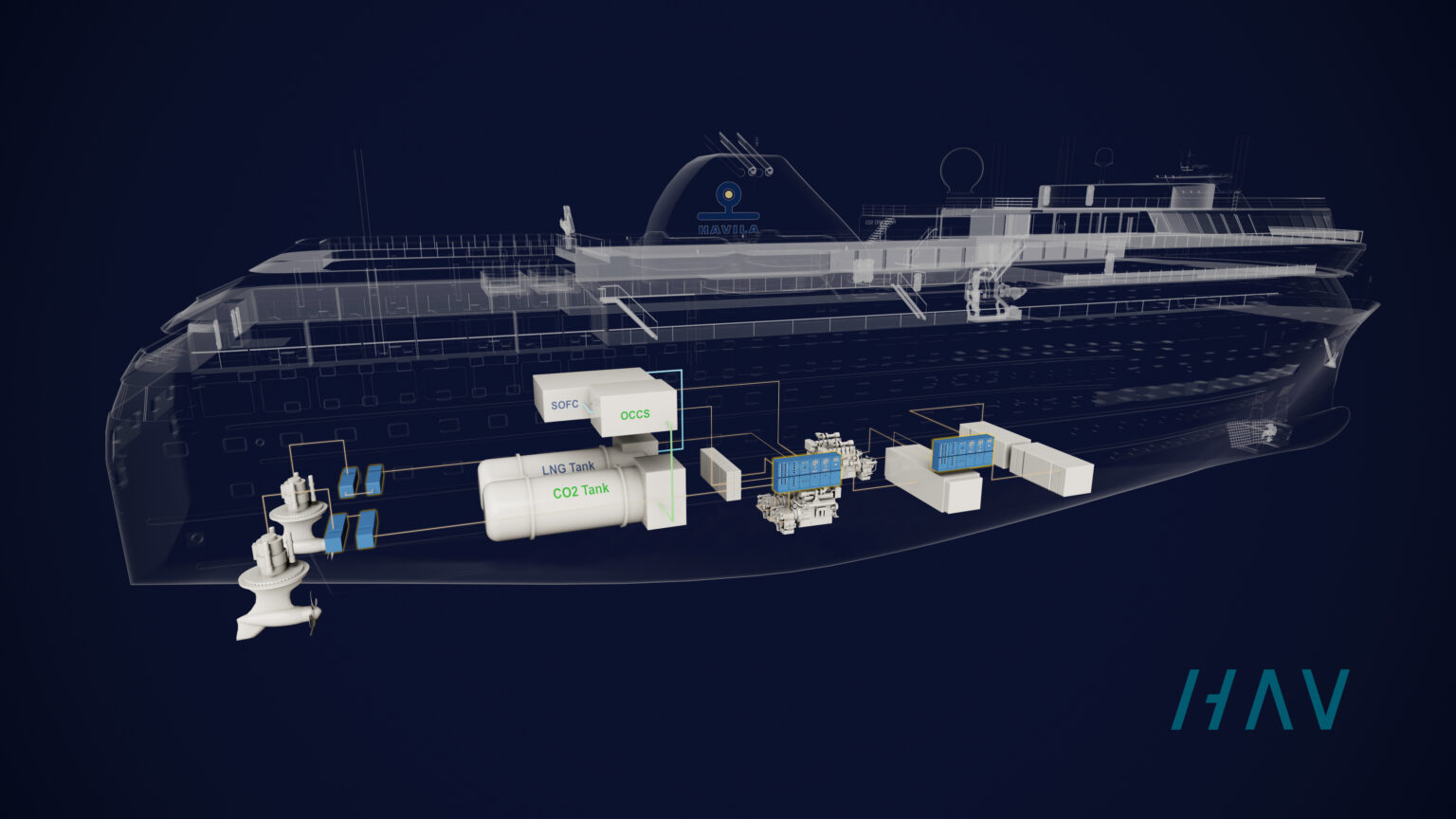LNG Plus Carbon Capture
Research project could see innovative CC technology on Havila Voyages’ cruise ships

A Norwegian consortium has teamed up to develop a new solution for decarbonising maritime transport by capturing and storing CO2 from LNG-fuelled Solid Oxide Fuel Cell (SOFC) powertrains.
The project is called LNGameChanger and is led by maritime technology supplier HAV Group, plus coastal cruise operator Havila Voyages, natural gas company Molgas Norway (formerly Gasnor), and research institution SINTEF.
The potentially game-changing research project was unveiled at a press conference in Ålesund, Norway, held on board Havila Voyages’ coastal cruise ship Havila Capella in March.
“The LNGameChanger project aims to create the basis of a new product in the form of a low-or zero-emission solution for the maritime industry, strongly positioned for a growing LNG market and infrastructure with superior efficiency to alternative solutions. If this objective is achieved, LNG can become not only a transitional fuel, but a permanently viable option in low-emission maritime transport, alongside, for example, hydrogen,” says Gunnar Larsen, CEO of HAV Group.
Given a successful outcome of LNGameChanger, project owner HAV
Group has a clear ambition to further mature the solution towards commercialisation and include it in the company’s growing portfolio of low-and zero-emission solutions to the maritime sector.
The project’s primary objective is to design an innovative, decarbonised maritime LNG-fuelled powertrain combining solid oxide fuel cells (SOFC) and high-efficiency onboard CO2 liquefaction and storage, resulting in a CO2-equivalent intensity between the 2045 and 2050 emission limits.
Secondary objectives are to confirm energy efficiency and emission targets for the SOFC powertrain with CO2 capture in stand-alone mode. The project also aims to establish a user case with a vessel design and relevant operational profile to extract load profile characteristics and perform voyage simulations for the vessel in study. The user case may be Havila Voyages’ four coastal cruise ships. The performance of the solid oxide fuel cell (SOFC) powertrain integrated with the onboard CO2 capture and storage (OCCS) will be determined. It will also evaluate overall space and weight requirements and adaptability for marine applications.
Boosting SOFCs
Meanwhile HD Korea Shipbuilding and Offshore Engineering (HD KSOE), HD Hydrogen, and DNV recently signed a Joint Industry Project (JIP) agreement to develop and validate Pressure Swing Adsorption (PSA) technology for carbon capture in Solid Oxide Fuel Cells (SOFC).
SOFCs are high-efficiency fuel cells that generate electricity using natural gas, ammonia, or hydrogen as fuel. As part of this agreement, HD KSOE and its subsidiary HD Hydrogen will explore the integration of PSA-based carbon capture technology into SOFCs for shipboard power generation. The ultimate goal is to replace conventional ship propulsion and power generation engines with SOFC systems, significantly reducing maritime carbon emissions.
PSA technology selectively captures and releases CO2 by cyclically altering pressure within a capture chamber. This approach is expected to be at least 40% more energy-efficient than conventional CO2 absorption technologies used in marine applications.
Seunghwan Oh, Vice President of Business Development and Strategy at HD Hydrogen, said: “PSA technology is a key enabler in the era of Carbon Capture, Utilization, and Storage (CCUS). Integrating this technology with SOFCs, one of the most efficient power generation systems available, can substantially contribute to maritime decarbonisation.”
Vidar Dolonen, Regional Manager for DNV Korea & Japan, emphasised the importance of prioritising technological solutions for emissions reductions: “The decarbonisation of shipping is a complex challenge, requiring a mix of solutions to bridge the transition to carbon-neutral fuels. Energy efficiency measures and onboard carbon capture technologies can play a crucial role in reducing emissions while the industry works towards securing reliable supplies of alternative fuels. This collaboration represents an important step in exploring practical and scalable carbon reduction strategies for the maritime sector.”
get
in touch

Constructive Media
Constructive Media
Hornbeam Suite
Mamhilad House
Mamhilad Park Estate
Pontypool
NP4 0HZ
Tel: 01495 239 962
Email: ibia@constructivemedia.co.uk

On behalf of:
IBIA London Office
Suite Lu.231
The Light Bulb
1 Filament Walk, Wandsworth
London, SW18 4GQ
United Kingdom
Tel: +44 (0) 20 3397 3850
Fax: +44 (0) 20 3397 3865
Email: ibia@ibia.net
Website: www.ibia.net

Emails
Publisher & Designer: Constructive Media
ibia@constructivemedia.co.uk
Editor: David Hughes
anderimar.news@googlemail.com
Project Manager: Alex Corboude
alex@worldbunkering.net
